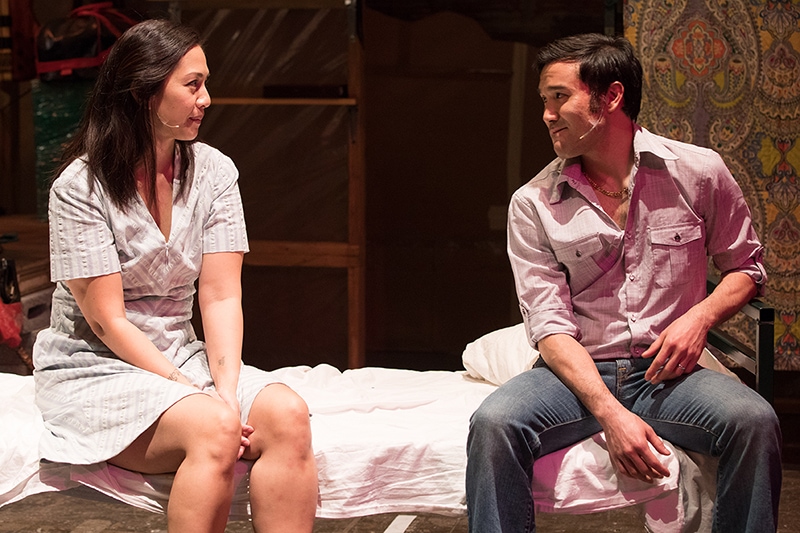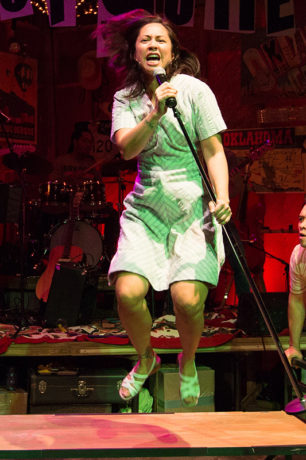Many theater people grow up daydreaming of the classic shows they want to take on one day. They envision themselves directing Angels in America, or performing the lead role in Phantom of the Opera.
Not Natsu Onoda Power. As a little girl, she did have a dream – but it was to make cartoons. Her favorite cartoonist was Osamu Tezuka, a famous manga artist who helped define the genre of Japanese comics. Tezuka kept a studio in Tokyo, and when Onoda Power was twelve, she visited his studio, hoping to catch a glimpse of him at work or chatting with his fans. That day she was in luck: not only was he there, but she found a moment to approach him with the cartoon she’d been making with her brother. “Can I be your assistant?” she remembers asking.

Come back in three years, when you finish middle school, he told her, and Onoda Power was determined to do just that.
Tezuka died two and a half years later, in 1989, so Onoda Power never got a chance to show him her improved work. But his words had created in her the discipline and curiosity to make art, and to learn as she went.
“This is a common narrative, you know,” Onoda Power said. “People would say, ‘Can you look at my manuscripts?’ Some of them would become assistants. Through that, they could launch their own career.”
These self-aware words are typical of someone who’s attentive to the twists and turns of story, who uses multiple media to translate her ideas to the stage. Today, Onoda Power isn’t a cartoonist, but rather a director, author, and theater professor at Georgetown. The most recent show she worked on is Vietgone, which DCMTA writer John Stoltenberg called “a full-on fusion of fun” in his review. But Vietgone is no empty comedy. It tackles PTSD, American involvement in the Vietnam war, casual sex in the 1970s, and families separated by bombings and attacks.
Vietgone is a story wrapped in a story: the character of the playwright imagines the romance that unfolded between his parents, Tong and Quang, at a Vietnamese refugee camp in Arkansas in the 1970s. Tong is portrayed as a cold, self-sufficient woman who tries to throw herself into her new life. Quang, a Vietnamese war hero who had to leave his wife and children behind, is torn between trying to find them and accepting the new world he now inhabits. Their romance is just as tortured and confused as it is funny.

Onoda Power signed on as Vietgone’s director after Studio Theatre’s artistic director, David Muse, contacted her about getting involved. It was just her brand of quirky, complex storytelling, Muse told her, especially because the show is rooted in other forms of expression (Vietgone draws on Bruce Lee movies, superhero comics, and rock music, among others). The show is visually rich, too, with a set like a punk recording studio crossed with a secondhand furniture store.
To helm Vietgone’s creative vision, Onoda Power brought her diverse theatrical experiences to the table. She started paying attention to theater after she read essays by Tezuka, her comics artist hero. “He wrote that you have to watch movies and plays to be a good storyteller,” Onoda Power said, “and so I did.” She became entranced and eventually ended up at Northwestern University for a Ph.D. in performance studies.
While at Northwestern, Onoda Power and her friends created Live Action Cartoonists, in which they made visual art in front of a live audience. “We put all our skills together and created performances that were inspired by the vocabulary of comics – large mural drawings done fast.” The Live Action Cartoonists also created projections and original scores for their performances.
Once Onoda Power moved to D.C., she directed shows known for both their balance of humor and drama and their arresting visuals. She developed a reputation as someone unafraid to take risks, and those risks usually pay off: some of Onoda Power’s most recent acclaimed shows include The White Snake (Baltimore Center Stage) and The Lathe of Heaven (Spooky Action Theater).
When she accepted Studio Theatre’s offer to direct Vietgone, Onoda Power was careful to respect the source material and its culture. “When David contacted me, he said, ‘I’m not just sending you the script because you’re Asian. And I know Vietnam’s different from Japan,’” Onoda Power remembered, laughing.

Muse was right, though, and Vietgone’s dramaturg (Lauren Halvorsen) put together an extensive packet about the play’s setting, timeline, language, and Vietnamese/American culture clashes. This ended up being essential to the Vietgone cast and crew’s understanding of Tong, Quang, and their bizarre, high-octane love.
“You find something in there you can relate to. And sometimes it takes a lot of research.” She also emphasized the importance of rehearsal: “Rehearsal is embodied research. You live in that world.”
Onoda Power and her cast also took care to draw out the nuance in characters who might come across as caricatures in the hands of less talented thespians. She worked with actress Eileen Rivera in creating Huong, Tong’s mother, who is sometimes domineering, rude, and resistant to the American culture that now presses in on her from all sides. That’s because Huong has experienced extreme hardship, though, and doesn’t know how to cultivate a new life in a place where she didn’t want to live. To prevent Huong from seeming like “a stereotypical Asian busybody mother,” Rivera often softens to reveal Huong’s underlying, more complex motivations.
Bobby, Tong’s white, American love interest, also became more human under Onoda Power’s eye. “A guy like him is the protagonist in every Vietnam War story, and this play turns that upside down,” she said. While it would have been easy to portray Bobby as insensitive and violent, Onoda Power and Jacob Yeh, who played Bobby, created a lovable, genuine, and somewhat naïve character inspired by Michael J. Fox. Tong picks Quang over Bobby, but it’s not because Bobby is scum. That’s just how love works sometimes, Onoda Power’s version of Vietgone suggests.
Vietgone will keep playing until May 20th, but Onoda Power is already preparing to launch several other projects. In June, she’s workshopping a Yiddish play called Bronx Express. She’s also at work writing her own play.
Through all that, she continues to teach theater courses at Georgetown. In one of her classes, students adapt non-dramatic work to the stage. “They get to know these texts so well by embodying them,” Onoda Power said. “Performance is a powerful mode of research.”
She, too, shows no signs of stopping her offbeat, wonderfully envisioned research.
Vietgone plays through May 20, 2018, at Studio Theatre – 1501 14th Street NW in Washington, DC. For tickets, call the box office at (202) 332-3300, or purchase them online.
LINK:
Review: ‘Vietgone’ at Studio Theatre by John Stoltenberg




